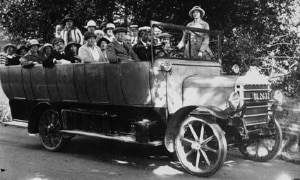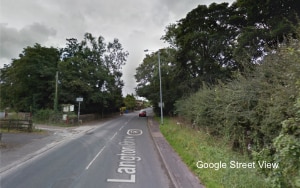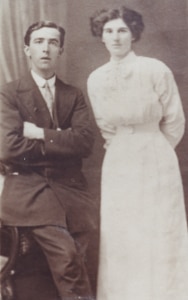
Three men, all of whom had served in the army during the Great War, were killed in an horrific road accident near Eccleston, Lancashire, in the early evening of Sunday, 7th September 1924. At 3pm that afternoon, William Rawlinson left his home in Croston with two companions, Thomas Bullen and Harry Whittle, ostensibly for a visit to a pigeon loft six miles away in Wrightington. The three men all mounted Rawlinson's motorcycle, a 1924 Triumph of four-horse-power capable of reaching a speed of 50mph. The deputy coroner, 42-year-old Lieutenant Colonel Harold Parker D.S.O., would later say that it "was absolutely a ridiculous way of riding a motor cycle" as "control of the machine was impossible, as the body [of the driver] was right between the handle bars." Rawlinson was a 29-year-old joiner who had enlisted into the King's Own Scottish Borderers in 1915, and became a sergeant instructor in the Army Gymnastic Staff. Thomas Bullen, a 29-year-old horse-driver, and Harry Whittle, a 34-year-old tailor, had both enlisted into the Chorley company of the Accrington Pals in September 1914, and both had been wounded on the opening day of the Battle of the Somme. All three men were married, each with one child. From the time the three men left Rawlinson's home in Croston, nothing further is known of their movements until 7.30pm when they were seen to be somewhat under the influence of drink in the Original Seven Stars, a farm three-quarters of a mile north of Standish village on the road to Eccleston that also ran a beerhouse. Patrick Smith, a dealer in antiques who helped out in the beerhouse, would later testify that he refused to serve the men more drink as they had had enough. The licensee, Andrew Clark, recalled that he had advised Rawlinson, who was a friend of his, to leave the motorcycle behind and take a charabanc home. The advice was ignored and the three men left on the motorcycle at about 8.05pm, twenty minutes after sunset.
Two hours before the three men left the Original Seven Stars, a 23-seater charabanc driven by Harold Fairhurst, and filled with passengers, left Wigan on a circular tour. At about 8.15pm, the charabanc had passed through Eccleston and was travelling slowly along Langton Brow when Fairhurst was shocked to see a motorcycle travelling towards him at high speed from the direction of Heskin. The motorcycle - exiting the slight left bend at Heskin Bridge on the wrong side of the road - was being driven by Rawlinson, sitting on the petrol tank, with Bullen on the seat behind, and Whittle riding on the pillion. Fairhurst immediately applied the brakes, bringing the charabanc to a stop on the correct side of the road outside of Sydbrook Farm. It was to no avail. Maud Gaskell, a passenger sat alongside Fairhurst in the charabanc, would later describe how the motorcycle approached "like a whirlwind" and made straight for the charabanc as if the driver had lost his head.
At the inquest that was held two days later, on the evening of 9th September, a verdict of accidental death was recorded for each of Rawlinson, Bullen and Whittle. The deputy coroner, Harold Parker, remarked that "The poor fellows are dead now, but nobody is to blame at all for what has happened. They have paid a rather big penalty." © Andrew C Jackson 2020 Compiled from articles in the Lancashire Daily Post of 8th and 10th September 1924.
|



